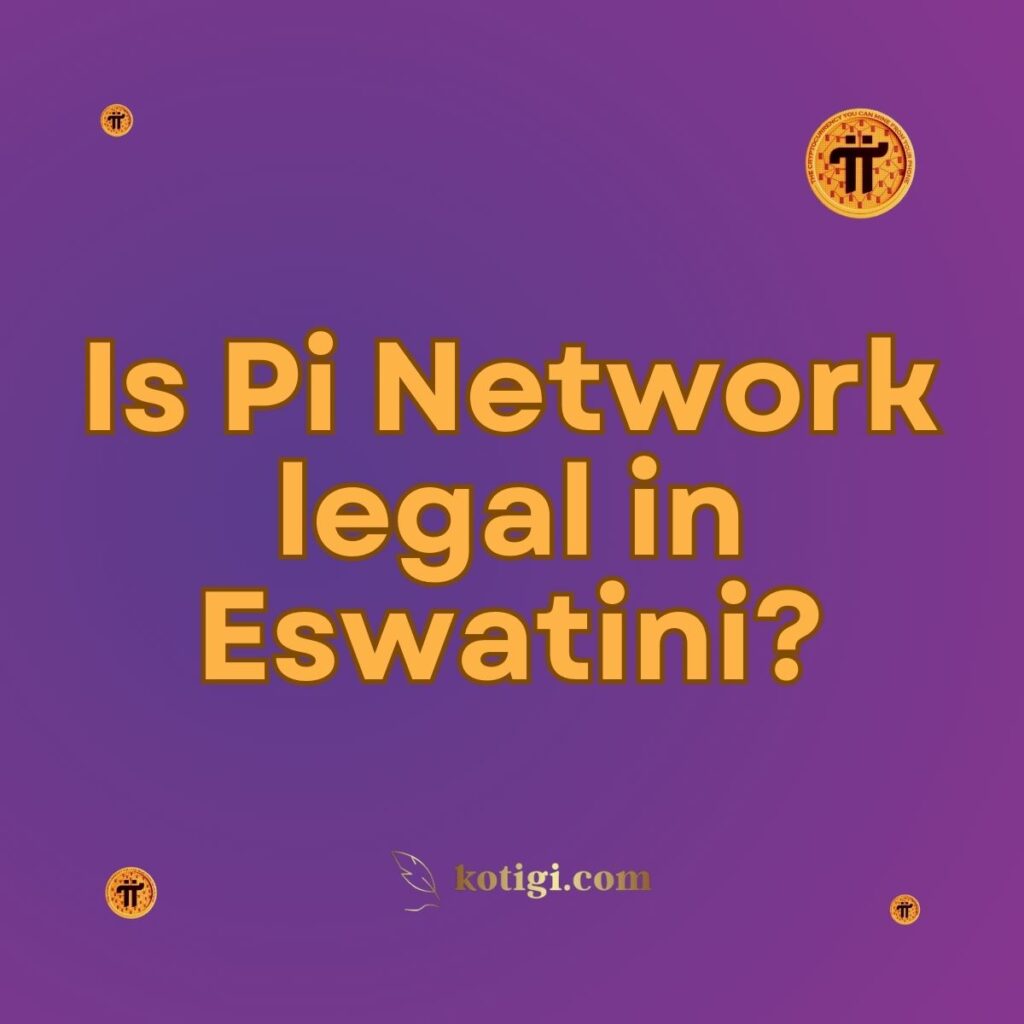
Is Pi Network legal in Eswatini?
Pi Network is currently legal in Eswatini. Although the country does not have specific regulations regarding cryptocurrencies, there are no explicit legal barriers preventing users from participating in Pi Network. However, as the global regulatory environment for digital assets evolves, users in Eswatini should remain aware of any future government directives related to cryptocurrencies.
Introduction
As Pi Network grows globally, many users in Eswatini are curious about its legal status. This mobile-based cryptocurrency mining platform allows users to mine Pi coins on their smartphones, providing an accessible way for individuals to participate in the blockchain space. However, questions regarding its legality often arise due to the ambiguous regulatory status of cryptocurrencies in various countries, including Eswatini. In this article, we will examine the current legal status of Pi Network in Eswatini, explore its regulatory landscape for digital assets, and discuss potential future implications for users.
1. Overview of Cryptocurrency Regulations in Eswatini
1.1 Lack of Cryptocurrency-Specific Regulations
Eswatini, like many other African nations, has yet to implement specific regulations targeting cryptocurrencies. The country’s financial system is regulated by the Central Bank of Eswatini (CBE), but the bank has not issued any formal legal framework for managing or regulating cryptocurrencies such as Bitcoin, Ethereum, or Pi Network. This regulatory gap means that users can participate in Pi Network without facing any direct legal challenges, but they should remain cautious as the country’s stance could change.
1.2 Central Bank of Eswatini’s Position on Digital Assets
In the past, the Central Bank of Eswatini has expressed interest in studying the role of cryptocurrencies in the country. Although it has not implemented a clear policy, the bank has acknowledged the rising popularity of digital assets and has indicated that it is monitoring their development. The lack of immediate regulation gives users in Eswatini some freedom to engage in cryptocurrency mining and trading. However, the CBE may issue new regulations or guidelines in the future as digital assets become more widespread.
1.3 Potential for Future Regulation
Given the rising interest in cryptocurrencies globally, Eswatini may eventually decide to develop a more structured regulatory approach to digital assets. While Pi Network operates in a legal grey area for now, it’s important for users to stay informed about potential future regulations. If the Central Bank of Eswatini or other regulatory bodies introduce new policies, Pi Network users may need to comply with additional requirements, especially if the platform transitions to a fully decentralized blockchain with tradeable Pi tokens.
2. Legal Considerations for Pi Network Users in Eswatini
2.1 Current Legal Status of Pi Network
As of now, there are no specific laws in Eswatini that directly regulate the use of Pi Network or mobile-based cryptocurrency mining platforms. This means that users can legally mine Pi coins without facing any government restrictions. However, since Pi Network is still in its development phase and Pi tokens have no real-world value, the platform operates in a non-monetary space. Once the Pi token becomes tradable, Eswatini’s authorities may reassess the legal framework around such activities.
2.2 Cryptocurrency Trading and Exchanges
Currently, Pi Network is focused on mobile mining, which does not involve the buying or selling of tokens. However, as the network moves toward full decentralization and Pi tokens become tradable on exchanges, Eswatini may need to address the legal aspects of cryptocurrency trading. This could involve Know Your Customer (KYC) regulations, Anti-Money Laundering (AML) policies, and other legal obligations that Pi Network users in Eswatini might need to follow.
2.3 Compliance with Financial Regulations
Although there are no cryptocurrency-specific laws in Eswatini, general financial regulations such as AML and counter-terrorism financing (CTF) laws still apply. If Pi tokens gain value and are used for financial transactions, users should be prepared for increased regulatory scrutiny. It is important for Pi Network users to be aware of the broader financial regulations that could affect their participation, especially if they decide to engage in trading or using Pi for payments in the future.
3. Risks and Challenges for Pi Network Users in Eswatini
3.1 Regulatory Uncertainty
One of the primary risks for Pi Network users in Eswatini is regulatory uncertainty. While there are no laws preventing the use of Pi Network, the evolving global landscape of cryptocurrency regulation means that changes could happen at any time. Users should stay informed about any new developments and be prepared to adapt to potential legal requirements.
3.2 Future Taxation on Digital Assets
At the moment, there are no taxation policies in Eswatini specifically targeting cryptocurrency activities. Since Pi tokens currently have no real-world value, there is no immediate tax liability for mining Pi. However, as Pi becomes tradable and holds monetary value, the government may introduce tax regulations on cryptocurrency earnings. Users should keep records of their Pi mining activities and be prepared for potential tax obligations in the future.
3.3 Data Privacy Concerns
Like many countries, Eswatini has general data protection laws, but they may not fully cover the use of digital platforms like Pi Network. Users should be aware of the information they share within the Pi Network app, as their personal data could be subject to potential privacy concerns. Ensuring that Pi Network complies with international data protection standards, such as the General Data Protection Regulation (GDPR), can help protect user privacy.
4. Opportunities for Pi Network Users in Eswatini
4.1 Early Adoption in a Growing Market
For users in Eswatini, Pi Network presents an opportunity to participate in the cryptocurrency space at an early stage. Since Pi Network is still in its developmental phase, early adopters in Eswatini have the chance to accumulate Pi tokens before they gain real-world utility and value. This early participation could potentially lead to future financial benefits if Pi becomes a widely adopted cryptocurrency.
4.2 Potential for Digital Payments
In the future, Pi tokens could be used for digital payments, offering users in Eswatini an alternative to traditional financial systems. This could be especially valuable in a country where access to financial services may be limited for some individuals. By participating in Pi Network, users can become part of a decentralized financial system that may offer new solutions for cross-border payments and remittances.
4.3 Community Engagement and Innovation
Pi Network’s decentralized model allows users to contribute to the development of the network and its community-driven initiatives. In Eswatini, this presents an opportunity for users to engage with a global network of like-minded individuals and collaborate on projects that could benefit the broader cryptocurrency ecosystem. The growth of Pi Network could also inspire local developers to build applications on Pi’s blockchain, contributing to technological innovation in Eswatini.
5. The Future of Pi Network in Eswatini
5.1 Potential for Token Utility and Value
As Pi Network continues to evolve, there is potential for Pi tokens to gain value and become a widely used form of digital currency. In Eswatini, this could open up new possibilities for digital commerce, remittances, and financial inclusion. The platform’s success will depend on its ability to create real-world use cases for Pi tokens, and users in Eswatini could be at the forefront of this adoption.
5.2 Regulatory Developments
As Pi Network grows in popularity, it is likely that the Central Bank of Eswatini or other government bodies will issue more concrete regulations on cryptocurrencies. These regulations may impact how Pi tokens are used, traded, and taxed. Users should stay informed about any changes in the legal landscape and be prepared to comply with new rules as they emerge.
5.3 Integration with Eswatini’s Financial Ecosystem
If Pi Network successfully transitions to a fully decentralized blockchain and Pi tokens gain value, there could be opportunities for integration with Eswatini’s financial ecosystem. Local businesses could start accepting Pi tokens as a form of payment, and developers in Eswatini could explore ways to build applications using Pi’s blockchain technology. This integration could enhance financial inclusion and drive digital innovation in the country.
Conclusion
Pi Network is currently legal in Eswatini, and users can mine Pi tokens without facing any legal restrictions. While the regulatory environment for cryptocurrencies in Eswatini remains underdeveloped, the country’s openness to financial innovation suggests that Pi Network users should monitor potential future regulations. By participating in Pi Network now, users in Eswatini have the opportunity to become early adopters of a promising cryptocurrency and contribute to its growth as it transitions into a fully decentralized platform.
Key Takeaways
- Pi Network is legal in Eswatini, with no specific laws currently regulating its use.
- The Central Bank of Eswatini has not issued formal cryptocurrency regulations, but users should stay informed about potential future developments.
- There are no current tax obligations for mining Pi tokens, but users should be prepared for future tax regulations as Pi gains value.
- Data privacy concerns may arise, so users should ensure that Pi Network complies with international data protection standards.
- Early adopters in Eswatini can accumulate Pi tokens, potentially benefiting from future real-world use cases and token value.





